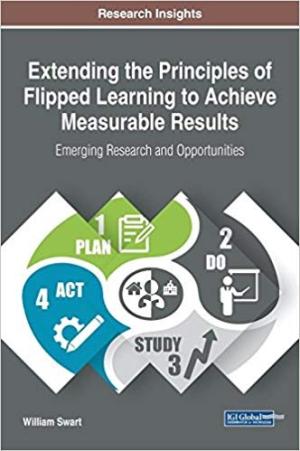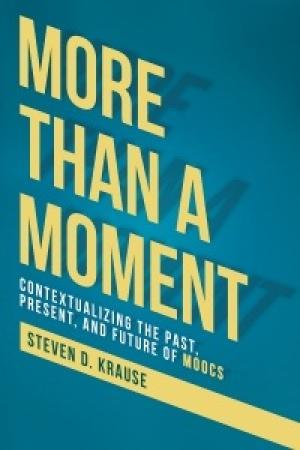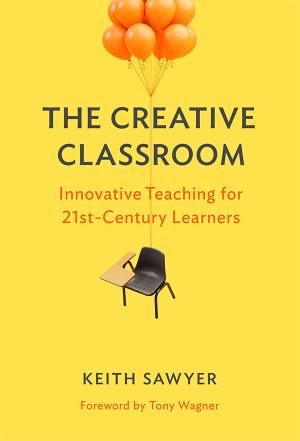Resources by Matthew D. Campbell

As higher education continues to grapple with expanding online coursework in meaningful ways, faculty must confront a perennial question: how can online coursework mirror the rigor of in-person classes while preserving the flexibility that makes online learning attractive to students? In Extending the Principles of Flipped Learning to Achieve Measurable Results: Emerging Research and Opportunities, William Swart argues that flipped learning has the potential to balance these demands by winnowing the transactional distance, a barrier to student engagement, that is common in traditional coursework. In traditional learning, a lecture typically occurs in class and homework extends beyond the classroom; conversely, flipped learning requires students to study course material at home, including recorded lectures, before engaging in collaborative, problem-solving activities in class. By flipping the traditional model of higher education, flipped learning allows students to invest more deeply in their coursework while simultaneously receiving feedback and peer support in class. While flipped learning may be alluring, enacting such a dramatic reordering requires resources, knowledge, and tools that most faculty do not possess. Written in a straightforward, practical style, Swart’s text provides a viable throughway for faculty members hoping to enact a flipped classroom. Swart begins his exploration of the concept by reviewing the proliferation of online coursework and noting the near-universal agreement among university faculty regarding the disparity of quality in online learning versus face-to-face learning. As an antidote to this pattern, Swart touts the considerable benefits that flipped learning affords students, instructors, and college administrators. Following this introductory material, the text grounds the Plan-Do-Study-Act (P-D-S-A) cycle as the primary vehicle for introducing, executing, and maintaining a flipped classroom. This cycle, originating from business and management, ensures that meaningful learning occurs throughout a new intervention, rather than relying solely on outcome data to judge the effectiveness of an intervention. The heart of the text unpacks each step of the PDSA cycle and its use in a flipped classroom, offering practical advice and data to support those wishing to use the flipped model. This occurs through direct discussion of the model and an embedded case study that illustrates core concepts. Before closing with an exploration of possible future research, Swart also includes candid discussion of the challenges—both anticipated and unanticipated—that flipped learning often produces. As Swart notes, while there is positive evidence regarding student preferences, achievement, and satisfaction concerning flipped learning, there is a paucity of research documenting its role in promoting other desirable values in students. This text adds to a growing body of research explicating the promise of flipped learning within K-12 and higher education. Particularly for faculty members in theological education or religious studies in a liberal arts setting, this text provides short-term and lasting benefits. Swart’s thorough unpacking of flipped learning delivers a robust catalog of research-based, practical advice for enacting this model. Perhaps most valuable for these faculty is the opportunity for students to engage with weighty ideas in a collaborative manner after having initial, independent preparation.

As recently as 2012, massive open online courses (MOOCs) looked poised to revolutionize higher education, but in just a few years their flaws and problems have made them into a less relevant model. In More than a Moment, Steven D. Krause explores MOOCs and their continuing impact on distance learning in higher education, putting them in the context of technical innovations that have come before and those that will be part of the educational future. Krause writes about his own experiences as a participant in several MOOCs and the experiences of faculty who developed and taught MOOCs. Contrary to many early claims from educational entrepreneurs, they were never entirely “new,” and MOOCs and their aftermath are still at the heart of the tensions between nonprofit universities and for-profit entities, particularly online program management firms, in delivering distance education. While MOOCs are no longer a threat to education in the United States, they are part of the ongoing corporatization of education and remain part of conversations about experienced-based credit, corporate training, and open education. Presenting historical, student, teacher, and administrative perspectives, More than a Moment is a well-rounded treatment that will be of interest to academics and entrepreneurs interested in distance education, online pedagogy, online program management, and public-private partnerships in higher education. (From the Publisher)

The Creative Classroom presents an original, compelling vision of schools where teaching and learning are centered on creativity. Drawing on the latest research as well as his studies of jazz and improvised theater, Sawyer describes curricula and classroom practices that will help educators get started with a new style of teaching, guided improvisation, where students are given freedom to explore within structures provided by the teacher. Readers will learn how to improve learning outcomes in all subjects—from science and math to history and language arts—by helping students master content-area standards at the same time as they increase their creative potential. This book shows how teachers and school leaders can work together to overcome all-too-common barriers to creative teaching—leadership, structure, and culture—and collaborate to transform schools into creative organizations. (From the Publisher)